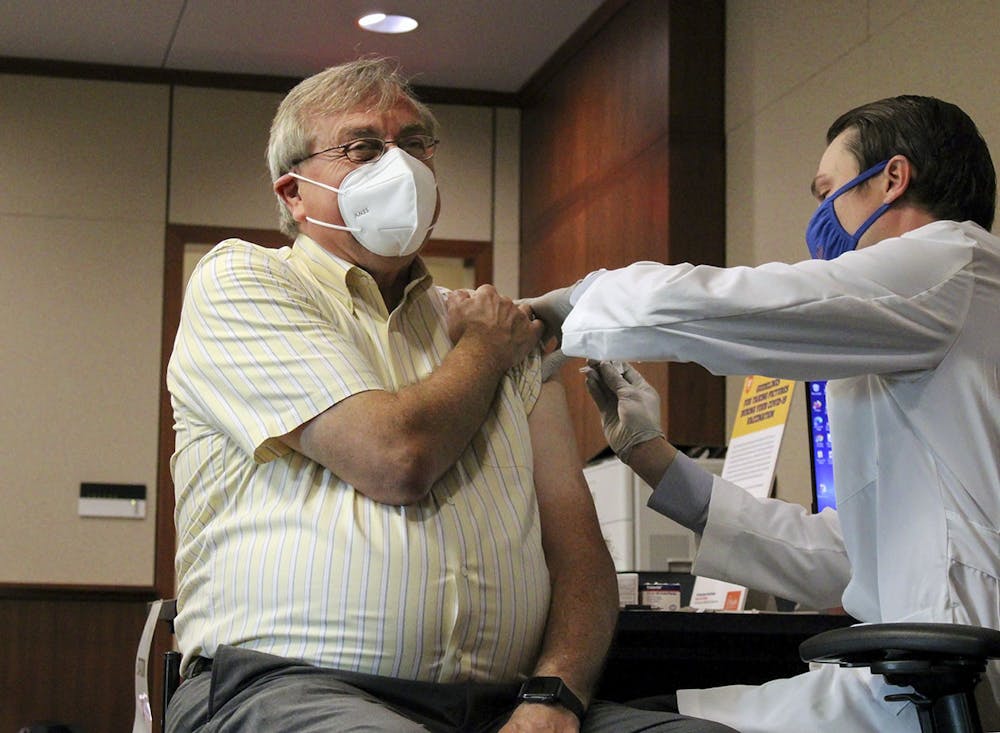Gov. Ron DeSantis’ recent executive order expanded COVID-19 vaccine eligibility to some essential workers, such as law enforcement, firefighters and K-12 employees over the age of 50, but excluded higher education faculty.
The United Faculty of Florida, UF’s faculty union, published a statement on its website Thursday expressing disappointment in the governor’s decision to ignore higher education faculty in his vaccination plans. The order takes effect Tuesday and includes people who are deemed at high risk of COVID-19 complications by doctors.
“The United Faculty of Florida (UFF) and the 22,000 people we represent congratulate the public servants who are now eligible for the vaccines and celebrate their chance at hope,” the statement said. “Nonetheless, we are appalled by the governor’s decision to exclude college and university workers from this mandate.”
Union president Paul Ortiz sent an email to UF President Kent Fuchs Friday requesting that he urge Gov. DeSantis to include higher education staff in Florida’s vaccine program. Fuchs responded by saying UF has been in contact with state officials since December to reach that goal.
“All we’re asking President Fuchs to do is please use your power and authority as president of our university to ask Gov. DeSantis to include higher education staff and faculty in that vaccine queue,” Ortiz said.
UF Health has offered vaccinations to staff members over 65 years old since January.
A Centers for Disease Control study found U.S. counties where many college students attend in-person classes faced a 56% increase in COVID-19 cases in August. Another study in the Computer Methods in Biomechanics and Biomedical Engineering journal included UF in an analysis that found most COVID-19 related deaths on campuses were faculty.
Still, UF pushed forward with plans to offer in-person classes to about 15,000 students this semester — a decision that caused tension between UF administration and faculty.
On Feb. 8, Alabama expanded vaccine eligibility to employees in the education sector, including higher education staff. The Alabama public health website does not indicate that one needs to be a resident to get a vaccine in Alabama. Some higher education faculty from across Florida, Georgia and Mississippi have been driving to Alabama to get vaccinated, Ortiz said.
“I think it’s great that Alabama has stepped up,” Ortiz said. “But I think it’s shameful that Florida, a state of 22 million people, has to rely on the goodwill and graces of a much smaller state.”
Ortiz said he is hopeful higher education staff will be included in Florida’s next vaccine expansion, but others did not express the same optimism.
Pamela Gilbert, an English professor at UF, said UF Health is doing the best it can during a difficult situation, but she’s not satisfied with the state’s rollout of the vaccine so far.
“The emphasis on campus has been ‘Oh, well, spreading is not happening in the classroom.’” Gilbert said. “Great, but when you bring 50,000 young people in a town, spreading happens outside the classroom.”
States currently allowing higher education faculty to get vaccinated include Alabama, Arizona, Arkansas and Wisconsin. Vaccines in Alachua County are currently available for people over the age of 65, K-12 teachers 50 or older, law enforcement 50 or older, firefighters 50 or older, medical workers and people with high-risk medical conditions.
Gilbert sympathized with K-12 school children who she said need to get out of the house right now more desperately than college students, but she hopes that higher education staff are included in the next phase of the vaccine expansion.
“It really does seem like there was no plan in advance that he had so he’s sort of making it up as he goes along every day,” Gilbert said referring to Gov. DeSantis. “If people knew ‘Oh, this is the order, this is who’s gonna get it next’ then people would understand. But right now it’s like Thunderdome out there.”
Contact Alexander Lugo at alugo@alligator.org. Follow him on Twitter @AlexLugo67.

Alex is a fourth-year journalism student at UF and is in his third semester at The Alligator where he is serving as the university editor. He previously reported on university administration and the city and county commission. In his free time, he enjoys video games, traveling and being outdoors.






